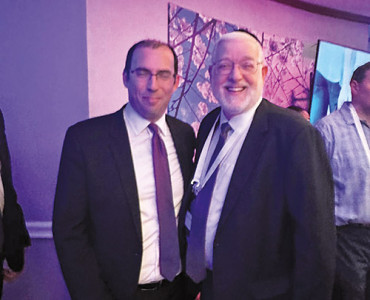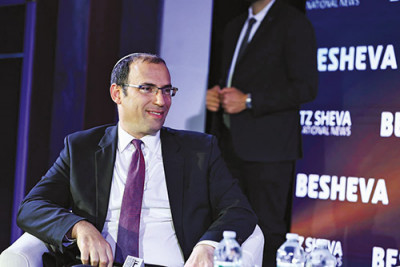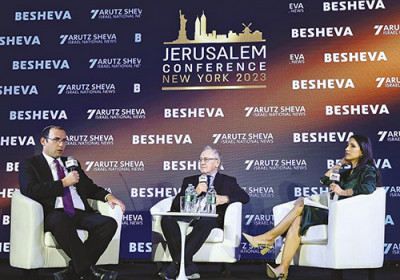
On June 4, Arutz Sheva and the Besheva Group hosted the Jerusalem Conference in New York. Following Sunday’s ‘Celebrate Israel Parade,’ eight Israeli Ministers presented: Nir Barkat (Economy), Ofir Sofer (Aliyah and Integration), Amichai Chikli (Diaspora Affairs), Meir Porush (Jerusalem and Jewish Tradition), Gila Gamliel (Environmental Protection), Amichai Eliyahu (Heritage), Ofir Akunis (Science and Technology) and Galit Distel-Atbaryan (Information). Other speakers included Israel’s UN Ambassador Gilad Erdan, Jerusalem Mayor Moshe Lion, World Zionist Organization Chairman Yaakov Hagoel, and Gush Etzion Regional Governor and Yesha Council Chairman Shlomo Ne’eman.
The keynote forum featured Knesset Constitution, Law and Justice Committee Chairman Simcha Rothman and Attorney Alan Dershowitz.
Rothman expressed, “Many people claim judicial reform will end democracy in Israel. I don’t know any country that lost its democracy because they changed how they select judges. I know many countries that lost democracy because very small, violent groups harassed and threatened elected officials until they gave up their views. People who don’t understand the difference between a protest and a violent attack need some crash course in democracy.”

Dershowitz noted, “Both sides misuse the word ‘democracy’ and overstate the dangers to Israel if either side prevails. There wouldn’t be a danger to democracy if, in fact, courts were weakened and didn’t have authority they have today. I also think we’ll have democracy if courts were strengthened or maintained the way they are.
“American courts make some of the most important decisions, taking them away from the legislature,” he continued. “I don’t think the status quo is an option, either. That’s not the way it should be in Israel, nor the US. There has to be self-enforcing respect for the judiciary.”
Dershowitz explained, “Their Supreme Court went too far. I don’t believe courts have power to make decisions about gas deals in Lebanon, whether Knesset decisions are unreasonable, or even whether Knesset members can serve in the cabinet. Those are political and economic decisions. There are areas the court must have the last word and cannot allow democracy to prevail. A countermajoritarian Supreme Court defends certain rights: free speech, due process for guilty people, including fair trials and counsel for accused terrorists. If the Knesset won’t give them, it has to be demanded by the courts.
“Compromise requires limitations on what the Supreme Court can do in areas other than core human, minority and free speech rights. Compromise permits Israel to thrive as one of the strongest democracies in the world.”

Rothman added, “Israel’s Basic Law doesn’t have freedom of speech. It’s protected even in comparison to countries that do have it in their basic law.”
Dershowitz suggested a system of checks and balances, contrasting, “The US left wants to weaken the Supreme Court. In Israel, it’s the right.”
Rothman noted, “The left wants the court to have super-powerful tools to cancel any laws it sees fit. They look at judges and see people like themselves. They know Israelis would never vote for them. This isn’t about big jurisprudence issues, rule of law or democracy. It’s ‘I want my way to win’ no matter the result of the elections.”
Dershowitz added, “If the judges were extremely right and the Knesset left, you have the same result.”

Aliyah and Integration Minister Ofir Sofer stated, “I feel a tremendous responsibility to continue ‘Shivat Tzion,’ a central part of Zionism and rebuilding our homeland. We look back at the long exile of our People, the expulsions, suffering and the Holocaust, and then, the rebirth of the State of Israel, we see how this shaped us as individuals and a nation.
“We’re still fighting for Jerusalem and other parts of the Land of Israel,” he added. “I was injured in 1996 in a battle around Joseph’s Tomb in Shechem. After I was hit, I thought of the heritage and values of our People and of the IDF.”
In his remarks, Israel’s UN Ambassador Gilad Erdan described the UN’s relevance. “It’s very important for Israel presence fighting in the arena. Our enemies don’t want peace. They weaponize the UN against us. They held shameful Naqba events. They transferred the Israeli-Palestinian conflict to the International Court of Justice. In the internet era, we fight for the minds of the young generation worldwide. Everything happening here doesn’t stay in New York. My main strategy is always being on offense. I am very proud to represent Israel; I think Israel is the most moral country around the world. We shouldn’t be ashamed about what we are doing.”
In a statement by David Saasa, chairman of the Besheva Group and the Jerusalem Conference, he wrote, “Even in these days of division, we must remember the diverse and magnificent mosaic of the Jewish people with its multitude of debates, voices, opinions, and positions is not a weakness.”
By Judy Berger










